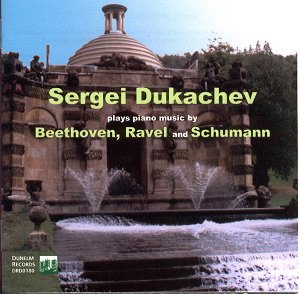Sergei Dukachev has made several recordings for Dunelm.
After postgraduate study at the Moscow Conservatoire, he was a semi-finalist
in the Beethoven Competition (Vienna) in 1989. He was appointed Artist-in-Residence
at Royal Holloway, University of London, in 2000.
For the present offering, Dukachev has chosen a demanding
hour's worth, particularly when one considers that, according to the
recording information given, it was recorded in one day. The choice
of Beethoven's early C major Sonata was brave, therefore: it is notoriously
tricky and, indeed, some wrong notes do slip in to the more exacting
passages. Perhaps more disturbing, at least initially, is the fairly
reverberant setting - yet despite this ambience, the actual piano sound
seems a little lacking in body.
Russian literalism informs much of the Adagio, and
despite some impressive moments (Dukachev's heavy bass invokes organ
pedals excellently at one point), he fails to penetrate much below the
music's surface. The cheeky third movement comes off quite well, despite
some rhythmic clipping in the Scherzo (the Trio could have been more
fantastical, also). This is, in general, a fairly enjoyable reading
(the fiddly finger-work of the finale, which can sound awkward, is here
well managed), but not one to return to on a regular basis.
The slightly light use of the sustaining pedal that
Dukachev applies to Ravel gives the Pavane a literal feel. The
tempo is nice and flowing, but the antique/mystique element is missing,
and chords are occasionally snatched at. Jeux d'eau, one of Ravel's
most popular pieces, is fluid and fluent, but textures unfortunately
messy at one point. Perhaps even more delicacy is called for here (and
the inclusion of the careless clearing of the pedal on the very final
chord is a serious error).
Schumann's Kreisleriana of 1838, a set of eight
fantasy pieces, is a marvellous but elusive example of Schumann's highly
individual language. Dukachev cannot be mentioned in the same breath
as the great interpreters of this piece: Horowitz (DG 445 599-2), Argerich
(DG 410 653-2), Lupu (Decca 440 496-2) etc. Dukachev is largely accurate
but rarely exciting. After easing into the music well, he is often unstable
(he does not seem to know what to do with Schumann's characteristically
obsessive repetitions in the 'Molto agitato', for example). Certainly
he needs to get closer to the soul of this quirky composition, which
only reveals its secrets after long and involved immersion in the music
of Robert Schumann.
Despite some impressive and beautiful moments along
the way, this recital does not add up to more than the sum of its parts.
Colin Clarke
